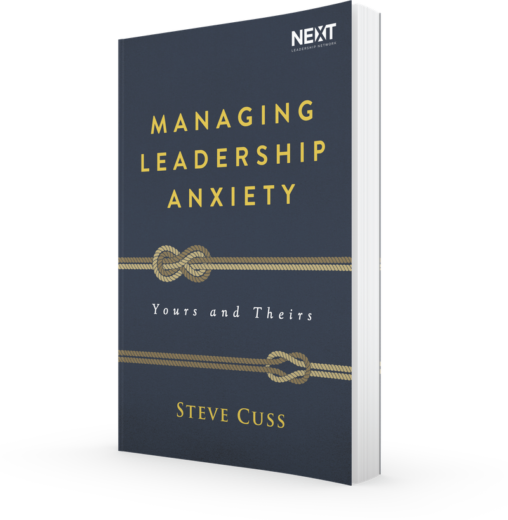
I am excited about the 3 books we helped publish at Leadership Network so far this year. Through our partnership with Thomas Nelson/HarperCollins, we are addressing topical issues of women in ministry, sexual questioning, and mental health. I have asked the authors to share a few thoughts from their books here on my own blog.
For this post I have invited Pastor Steve Cuss to share thoughts from his book “Managing Leadership Anxiety”. The stress of leading today is greater than any time in my 35 plus year leadership career. I recommend this book to every leader at any level.
Relief from Internal and External Pressure
I was 24 and a week into marriage when I walked into my first intensive care unit as a trauma chaplain. I had never seen a dead body before, I had never experienced deep grief before. To say I was green doesn’t begin to describe it.
Multiple times a day I would walk into rooms of extreme emotion; people dealing with some of the worst moments of their life. My job was to help them navigate those moments and I quickly learned just how much my own internal bubbling and triggers was infecting my ability to be present to people. Their anxiety was infecting my own. That is when I learned that:
- Anxiety isn’t just worry – it is any response, anything you do when you don’t know what to do, or any response when you aren’t getting what you think you need.
- An anger outburst can be an anxious response, so can mansplaining, or cynicism. But also, laying on a couch and binging tv shows can be an anxious response.
- Anxiety is a combination of triggers, false beliefs, and pressures we all face that stop us from being fully human, fully present to people and to the God who loves us
I also learned how to pay attention to group anxiety – how anxiety is contagious in a group and how sometimes the most anxious person in the room can hold the most power.
That experience combined plus a deep dive into Systems Theory has served me for years – I use these tools every day of my leadership. The journey from being managed by anxiety to managing it is a long, slow journey but the first step is to increase your awareness through these two simple questions:
1) Where does anxiety start for you?
2) How do you know when you are anxious?
Where does anxiety start for you>? Anxiety always starts physiologically, we first feel it in a spinning mind, a racing heart or a tightening gut. It might manifest in all three for you, but it usually starts somewhere. If you can figure out where it starts, you can intervene earlier and begin to manage it. Early intervention is everything in anxiety management. Once you know, you can move through it.
How do you know when you are anxious? We are way too tolerant and patient with the anxiety we all carry. I believe we should approach it with much more suspicion because anxiety is a spiritual dark force that competes for the space where our awareness of God resides. It is very difficult to be present to your anxiety and to God at the same time. So knowing when you are anxious can become an asset in helping you encounter God in more profound and freeing ways.
You can also notice group anxiety. Anxiety is contagious – people catch it like you catch a cold and often times the most anxious person in the room holds the most power. We spill our unaddressed anxiety into each other and suddenly people are interrupting, needing to have the last word, feeling shut down, having the meeting after the meeting.
Think about the team you lead: who always has the last word, who never speaks up? What recurring, predictable patterns can you identity? Learning to pay attention to process as much as content, the way people relate as much as what people say you can lead in a whole other gear. People notice content but they react to process. We all have the capacity to pay attention to process, it is like exercising a muscle – we all have this muscle, you just may need a few reps under your belt before you get the hang of it. But paying attention to process, looking for recurring, predictable patterns in your relationships and then learning how to break free of them can be a game changer in anxiety management.
Leadership is anxiety management – both yours and theirs. Not just worry, but any response that is toxic in you or in the people you lead. If you can notice your own and pay attention to the group’s, and learn to intervene, you can build significant health in your team and most powerfully, you can become more attuned to the people you are called to serve and the God who so dearly loves you.








